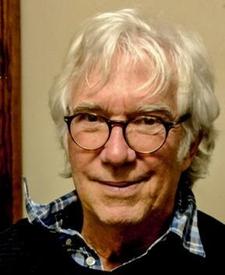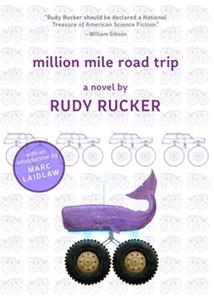 Rudy Rucker is a writer and a mathematician who worked for 20 years as a Silicon Valley computer science professor. He received the Philip K. Dick award twice, and his 40 published books include novels as well as nonfiction books on the fourth dimension, infinity and the meaning of computation. Rucker's new book, Million Mile Road Trip (Night Shade Books, May 7, 2019), is a phantasmagoric roller-coaster ride--smart and wildly funny, with a warmly beating heart. He lives in the San Francisco Bay Area.
Rudy Rucker is a writer and a mathematician who worked for 20 years as a Silicon Valley computer science professor. He received the Philip K. Dick award twice, and his 40 published books include novels as well as nonfiction books on the fourth dimension, infinity and the meaning of computation. Rucker's new book, Million Mile Road Trip (Night Shade Books, May 7, 2019), is a phantasmagoric roller-coaster ride--smart and wildly funny, with a warmly beating heart. He lives in the San Francisco Bay Area.
On your nightstand now:
I just finished John McPhee's old geology book, Assembling California. In these times it's soothing to realize there's a deep history running across hundreds of millions of years. Right now, I'm reading Luis Alberto Urrea, The House of Broken Angels. It's such a great view of Mexican American culture, with funny scenes, wisecracks and tear-jerking moments. Charlie Jane Anders's The City in the Middle of the Night is next on my reading list. I never know what she'll do.
Favorite book when you were a child:
I loved the world of C.S. Lewis's Narnia books. And Beverly Cleary's books. And a picture book by Robert Lawson, McWhinney's Jaunt--about a professor who rides across the country on a flying bicycle, held aloft by "Z gas" in its tires. I read all the Robert Heinlein novels, and especially liked Revolt in 2100 and Tunnel in the Sky. I was a huge fan of the SF master Robert Sheckley's Untouched by Human Hands. And when I was 14, I got hold of the Beat author William Burroughs's Naked Lunch, which I found on my big brother's bookshelf. Burroughs showed me that you can write about anything at all.
Your top five authors:
How about Flannery O'Connor, for her quirky, colorful tales in A Good Man Is Hard to Find. Getting into SF, Charles Stross's Accelerando is a feast, an extravaganza and one of the most important novels of the 21st century thus far. Cory Doctorow's Walkaway is a revelation, a deeply imagined design for a new society. Annalee Newitz's Autonomous pops open the cyberpuzzle of who the robots, androids and humans are. Christopher Brown's Tropic of Kansas is the most radical novel I've seen in years. A call to arms. And while I'm at it, a shout-out for Ursula Le Guin and The Left Hand of Darkness. So heavy, so eye-opening, so hypnotic.
Book you've faked reading:
The philosopher G.W.F. Hegel is my great-great-great-grandfather. And I'm very interested in philosophy. But somehow I've never managed to get through the epic The Phenomenology of Mind. But I have read enough of his extensive preface to refer to it now and then.
 Book you're an evangelist for:
Book you're an evangelist for:
I really love William J. Craddock's autobiographical novel from 1970, Be Not Content. It's about the early days of the psychedelic revolution, and it's deep and funny. When Craddock wrote his book, none of our notions about the '60s had been laid down and fossilized. The novel is wonderfully fresh. By 2012, it had been out of print for over 40 years, and used copies were insanely expensive. So I took it upon myself to republish it. I formed my own Transreal Press, got permission from Craddock's widow, and set about learning how to self-publish paperbacks and e-books--a useful skill. I've also published a few of my own works via Transreal Press, but Be Not Content remains the best seller.
Book you've bought for the cover:
A record album whose cover pulled me in was R. Crumb's cover for Cheap Thrills by Big Brother and the Holding Company, featuring Janis Joplin. And soon after that came a book with an equally alluring cover, R. Crumb's Head Comix. His mind-warps and humor definitely had some influence on my fiction.
Book you hid from your parents:
I grew up in Kentucky, and in the University of Louisville bookstore I found a text on types of mental illness. As a budding young author, I had to consider the option of going mad as an early career move. I got the book, and I'd look through it to find symptoms that I might be having, or that I might be able to convince myself that I had. It drove my parents nuts to see me do that. As if I weren't already enough trouble!
Book that changed your life:
David Foster Wallace's novel Infinite Jest. I read it when it came out, in 1996. I skipped most of the stuff about tennis and focused on the parts about the characters who were in recovery from drug and alcohol problems. Very funny, warped and colloquial writing. I was almost 50 years old, and I was realizing that I needed to clean up my own lifestyle. It was inspiring to read about the people in Infinite Jest. They made sobriety seem feasible.
Favorite line from a book:
It's hard to top William Burroughs, although I can't vouch for my textual accuracy. In one of his books, a native lad tells the explorer protagonist. "You win something like jellyfish, mister. Or it win you." Soon after that, our hero is covered with a slimy mollusc-like substance, and the boy tells the man, "Skin like that very hot for two, three days. Then... wearing the happy cloak!" Burroughs was definitely an influence on my science fiction. Indeed, in my cyberpunk Ware Tetralogy, I even have some symbiotic creatures called happy cloaks. You wear them over your shoulders, and they poke fangs into your spine through the nape of your neck. But they're your friends, and you like them.
Oh, and speaking of great lines, how about James Joyce's description of the night sky in Ulysses: "The heaventree of stars hung with humid nightblue fruit."
Five books you'll never part with:
Oh, let's just do one. A fat one. Thomas Pynchon's Gravity's Rainbow. I reread it every five or 10 years, reveling once again in the man's wit and the richness of his prose. I've persistently been trying to write like Pynchon over the course of my 23 novels, and in Million Mile Road Trip, I think I finally got close.
Book you most want to read again for the first time:
A volume of stories by Jorge Luis Borges. Labyrinths, say, or Collected Fictions. When I first read Borges, I was stunned at the richness of the trove.
Books you'd still like to write:
Before I write a novel, I need an idea for something odd that I want to see happening. One thing on my mind lately has been telepathy--I call it teep. I could write about a teep biz startup. And I see a way to make it new.

